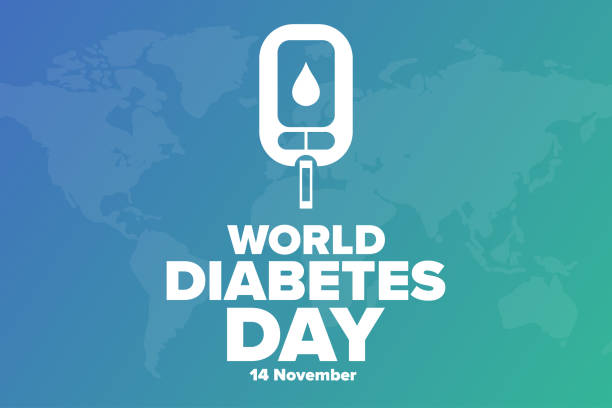
World Diabetes Day is the world's largest diabetes awareness campaign reaching a global audience of over 1 billion people in more than 160 countries. The campaign draws attention to issues of paramount importance to the diabetes world and keeps diabetes firmly in the public and political spotlight.
Diabetes is a condition where the body cannot properly process and use glucose from the food we eat. There are three main types of diabetes mellitus: Type 1, Type 2, and Gestational diabetes. Glucose is the body's primary energy source, and when it isn't properly absorbed, it can interfere with daily activities. Diabetes if left untreated could lead to fatal complications like cardiovascular issues, nerve damage, kidney damage, foot damage, skin infections, erectile dysfunction, depression, dental problems, and more.
Type 1: Previously known as insulin-dependent, juvenile, or childhood-onset is characterized by deficient insulin production and requires daily administration of insulin. Neither the cause of Type 1 diabetes nor the means to prevent it are known.
Type 2: Formerly called non-insulin-dependent, or adult-onset results from the body's ineffective use of insulin. The majority of people with diabetes have type 2 diabetes. This type of diabetes is largely the result of excess body weight and physical inactivity.
Gestational Diabetes: A type of diabetes develops exclusively in pregnancy when blood sugar levels get too high. Eating healthy, well-balanced foods and getting exercise can usually keep it well managed. But sometimes, insulin is necessary to help you manage blood sugar levels.
Importance of World Diabetes Day
Approximately 1 in 2 adults (44%), or around 240 million people, with diabetes, are undiagnosed, with the majority experiencing Type 2 diabetes. This condition can often be prevented through simple lifestyle changes and healthy eating habits. However, a lack of proper information and guidance about the signs and symptoms leads to missed opportunities for early diagnosis and prevention. As a result, nearly 541 million adults are at risk of developing Type 2 diabetes. World Diabetes Day has been a global platform for the advocacy and prevention of this silent-killer disease.
How to Diagnose Diabetes
HbA1c test. This blood test, which doesn't require not eating for a period of time (fasting), shows your average blood sugar level for the past 2 to 3 months. It measures the percentage of blood sugar attached to hemoglobin, the oxygen-carrying protein in red blood cells. It's also called a glycated hemoglobin test.
The higher your blood sugar levels, the more hemoglobin you'll have with sugar attached. An HbA1c level of 6.5% or higher on two separate tests means that you have diabetes. An HbA1c between 5.7% and 6.4% means that you have prediabetes. Below 5.7% is considered normal.
Random blood sugar test. A blood sample will be taken at a random time. No matter when you last ate, a blood sugar level of 200 milligrams per deciliter (mg/dL) — 11.1 millimoles per liter (mmol/L) — or higher suggests diabetes.
Fasting blood sugar test. A blood sample will be taken after you haven't eaten anything the night before (fast). A fasting blood sugar level of less than 100 mg/dL (5.6 mmol/L) is normal. A fasting blood sugar level from 100 to 125 mg/dL (5.6 to 6.9 mmol/L) is prediabetes. If it's 126 mg/dL (7 mmol/L) or higher on two separate tests, you have diabetes.
Glucose tolerance test. For this test, you fast overnight. Then, the fasting blood sugar level is measured. Then you drink a sugary liquid, and blood sugar levels are tested regularly for the next two hours.
A blood sugar level of less than 140 mg/dL (7.8 mmol/L) is normal. A reading of more than 200 mg/dL (11.1 mmol/L) after two hours means you have diabetes. A reading between 140 and 199 mg/dL (7.8 mmol/L and 11.0 mmol/L) means you have prediabetes.
Treatment
Depending on the type of diabetes you have, blood sugar monitoring, insulin, and oral drugs may be part of your treatment. Eating a healthy diet, staying at a healthy weight, and getting regular physical activity also are important parts of managing diabetes.
Bottom line
As we observe World Diabetes Day, it is important to emphasize the understanding of diabetes and the tests that can aid in its early detection and management. By recognizing the signs of high blood sugar and seeking timely medical advice, individuals can take proactive steps towards healthier lifestyles and minimize the risk of serious complications associated with diabetes. Medivision is equipped with comprehensive diabetes tests, making it easier to detect and monitor diabetes early on. Early intervention and informed choices are key to maintaining good health and enhancing quality of life.

